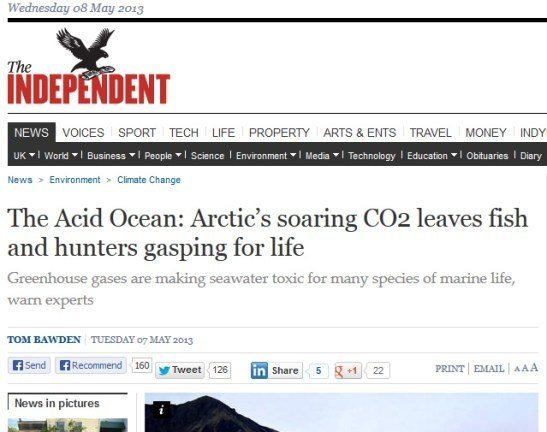Based on a press release and a brochure, the media says hunters are “gasping for life” in the Arctic.
According to a headline in the UK’s Independent newspaper, the ocean is turning to acid and the Arctic’s soaring CO2 leaves fish and hunters gasping for life. The subtitle tells us that “Greenhouse gases are making seawater toxic.”
Goodness gracious, with all that gasping going on it’s easy to miss the fact that the story itself is rather disappointing. Indeed, it contains a lot of fudge:
- “a report suggests“
- “potentially huge implications”
- “This could affect the livelihoods.”
- “The acidification could also put further pressure.”
- “‘This could have significant implications.”
- “communities are extremely worried.”
- “Ocean acidification is likely to affect.”
Let’s dial 911. People are worried about potential implications. Bad things could happen – a report suggests.
This article says the lead author of the report is a man named Richard Bellerby, who works for the Norwegian Institute for Water Research. But I can’t find it on the institute’s website. What I see, instead, is a “news article” written in-house, that says:
For three years the Arctic Monitoring and Assessment Programme (AMAP), a working group of scientists appointed by the Arctic Council, have collaborated on the first comprehensive study of ocean acidification in the Arctic. The results are now ready, and it is evident that ocean acidification is an environmental factor in marine ecosystems.
The results from the AMAP working group are presented this week, at an international conference on arctic ocean acidification. Read more about the conference and the key findings (.pdf). [italics and links in original]
If you click that key findings link you’re taken to a two-page press release. It fails to mention whether the report underwent any sort of peer-review, and doesn’t even tell us how long it is.
At the bottom of the institute’s website there’s a “Reports” button and a “Publications” button. Neither of them are helpful, since the most recent entries are dated 2012.
Over at the BBC, Roger Harrabin includes a link – in his own news story on this report – to a four-page document titled Article Ocean Acidification Assessment: Key Findings.
Let us be clear: this is a brochure. The title page and the final page contain no relevant content. A significant percentage of the other two pages are devoted to colour photographs. The only thing this document does is list 10 “key findings.” There are no footnotes or citations. This is the furthest thing from a scientific report – it is, instead, a marketing tool.
Ladies and gentleman, we are looking at yet another case of science-by-press-release. These people haven’t provided any evidence. They haven’t shared their data openly so that we can make up our own minds about the quality of their analysis. We’re simply expected to trust them.
The institute and its employees seem to think that all they need do is issue a press release and design a slick brochure.
Sadly, they’re absolutely correct. That was all the Independent required before it told the world that hunters are gasping their last in the Arctic.
see also
The Drama Queen Files – Exhibit #1 – Greenpeace’s ‘Battle for Britain’
The Drama Queen Files – Exhibit #2 – The ‘Carbon Bomb’ Pipeline
The Drama Queen Files – Exhibit #3 – The ‘Outraged’ Sierra Club
The Drama Queen Files – Exhibit #4 – Earth Day, 1970






